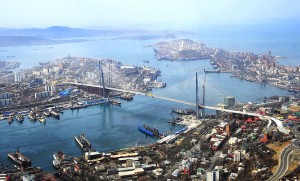Special to WorldTribune.com
By Donald Kirk, East-Asia-Intel.com
The Russian bear is definitely waking up after a long period of hibernation.
Russian troops have taken over the Crimean peninsula, and it’s hard to believe they’re about to leave under a blitzkrieg of scolding by President Obama and a phalanx of editorialists and European leaders.

The Russian entry into Crimea reminds us of the days after World War II when troops of the old Soviet empire were overrunning Eastern Europe, placing “satellite” states under the thumb of the late unlamented Joseph Stalin.
Call it an incursion or invasion, but the ease with which the Russians marched into Crimea, the autonomous region jutting into the Black Sea off the southern reaches of Ukraine, is probably the best you can say about the whole operation. At least, at this writing, no one has been killed. Let us hope the body count remains at zero.
At the other end of the Eurasian landmass, watching the drama on television, people may seem a little removed from this unreal apparition of old-style Russian might after thinking that Russia was no longer a superpower.
How could the spotlight have shifted so quickly from the artificially snowy slopes of the Winter Olympics at Sochi, a quick turn of eyes right from Crimea on a map of the Black Sea?
It’s disturbing to recall that protagonists in the Crimean War in the 1850s were Russians on the one hand and European powers on the other, with the Ottoman Empire, that is, Turkey, thrown in.
Wrangling over a patch of land with a population of about 2 million — a few hundred thousand more if the Russian navy port of Sevastopol, already in Russian hands, is included — may seem to have little importance to Northeast Asia. As the Russian bear awakens, however, historic interests and memories revive.
Just as the ancient Crimean city of Sevastopol is so important as Russia’s major naval base on the Black Sea, so Vladivostok is Russia’s opening to the Pacific.
The Russians acquired the region from the Chinese only 150 years ago as a spoil of the opium wars, and established a major port where once there had been a minor outpost.
Modern, resurgent China shows no sign of plotting to take back portions of the Russian Far East, but differences flare.
In the days of the “Sino-Soviet split” between the two “Communist giants,” I was writing about shots fired across the Amur River between Russia and northeastern China. Now the Chinese are invading by crossing the border and going into business where Russian power appears spasmodic.
The apparition of the roaring Russian bear has still more meaning for Japan and Korea. Remember the war between Russia and Japan in 1904 and 1905? That’s when the Japanese annihilated the Russians on land and on the sea, wiping out the Czarist fleet in the Tsushima Straits between Korea and Japan and, finally, taking over Sakhalin Island.
The Russians had their revenge toward the end of World War II when they recovered not only Sakhalin but the Kuril Island chain south from the Kamchatka Peninsula to the northernmost large Japanese island of Hokkaido.
Then they put a pampered puppet named Kim Il-Sung, who survived the war as a Soviet army officer far from any fighting, in charge of their “half” of Korea above the 38th parallel after Japan surrendered in 1945.
At Kim Il-Sung’s pleading, Stalin provided his regime with advanced weaponry during the Korean War. Up to the demise of Soviet rule in 1991, the Russians were shipping cheap oil as well.
The Scud missiles that North Korea has exported to Middle East clients and test-fired in recent days were descendants of Soviet models. So are most of North Korea’s other heavy weapons. Russians dream of a rail line from South Korea through North Korea, then joining the trans-Siberian railroad to Europe.
Moscow still avenges defeat in 1905 in a nasty dispute with Japan over four islands at the bottom of the Kuril chain that Tokyo claims.
President Putin is as unlikely as any of his predecessors to consider relinquishing them while showing what a tough guy he is in Crimea. He can also wield a commercial club over Japan, which has no oil and gas, much of which it imports from Russia.
Might Japanese tensions with China, and the need for natural gas, drive Japan’s Prime Minister Shinzo Abe toward Moscow? Abe is already uncertain about the strength of Japan’s alliance with the U.S.
The Russian show of force in Crimea is a lesson for South Korea as well. Seoul also has reason to worry as the U.S. pulls back its forces.
South Korea and Japan, when not quarreling with each other, may play Russia against China to avoid getting crushed in a bear hug by either of them.
Columnist Donald Kirk has been watching and sometimes covering the rivalry between Russia and China since the 1960s. He’s at kirkdon@yahoo.com.

You must be logged in to post a comment Login